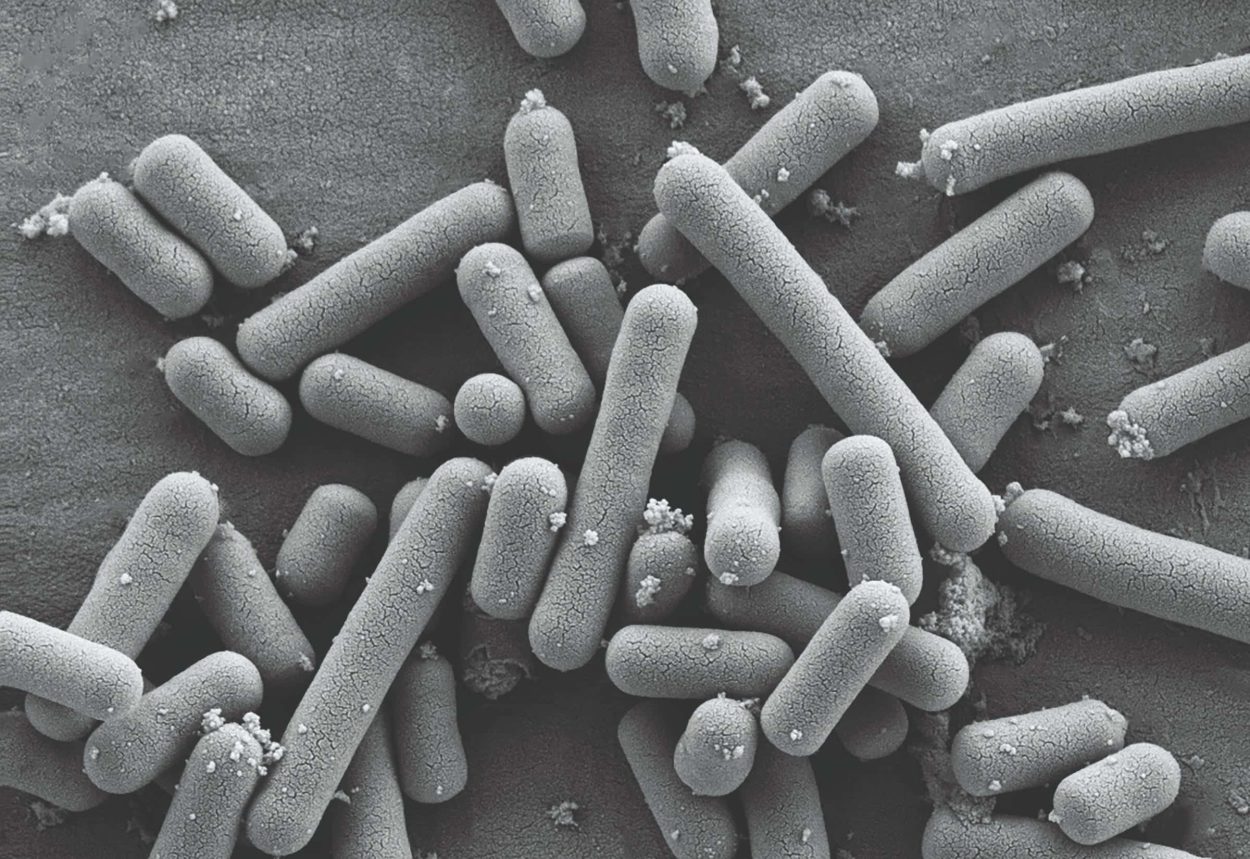IGI is a clinically validated probiotic that helps improve occasional gut-related discomfort and anxiety
Benefits
Love Your Guts (again)
A synergistic blend of three strains with multiple mechanisms documented in vitro associated with a healthy gut/GI tract.
In addition, the strains were shown to be strong producers of short chain fatty acids’ acetate, propionate and butyrate.
- For GI-related worry and stress
- Supports de gut-brain axis to help improve quality of life
- Helps lessen gut sensitivity and occasional discomfort
- Improves stool consistency, reduces occasional diarrhea and reduces occasional stress-related diarrhea

A multi-strain formula that helps to protect against everyday gut related anxiety and discomfort
Benefits validated by randomized, placebo-controlled clinical trials
Multifactorial mechanism of action
Premium strains of well-studied probiotic species
Optimized for Gut Health
Pediococcus acidilactici KABP® 021 (CECT 7483), Lactiplantibacillus plantarum KABP® 022 (CECT 7484) and Lactiplantibacillus plantarum KABP® 023 (CECT 7485).
- Genus: Pediococcus and Lactiplantibacillus
- Species: Acidilactici and Plantarum
- Strains: KABP® 021, KABP® 022 and KABP® 023
Protected Formulation for a Synergistic Effect

QPS-Backed Probiotic Strains for Safe GI Support
The three unique probiotic strains in IGI belong to species assigned a presumption of safety (QPS) by the European Food Safety Authority (EFSA).
Isolated from the gut of healthy volunteers, this well-adapted to the human intestine.

Gastrointestinal Discomfort
Gut-Wrenching
Occasional abdominal discomfort and gut-related stress are common and poorly understood gastrointestinal complaints that may occur in the absence of any medical condition.
Mild gut discomforts may vary over time, and include occasional symptoms:
Mechanism of action
KABP® Intensive GI has been shown in vitro research to have three mechanisms of action associated with gastrointestinal health and normal function.
Gut Check
- 1
Support of healthy intestinal permeability
IGI may contribute to healthy gut-barrier function and permeability, including the production of genes involved in forming tight junctions, as demonstrated in preliminary research in cultured intestinal cells.
- 2
Contribution to healthy gut ecology 6,7
IGI provides three unique beneficial probiotic bacteria that can withstand the hash conditions of the stomach and intestine and help maintain GI microbiota homeostasis. This combination of probiotics was shown in a clinical trial to promote the growth of beneficial Fecalibacteriumto enrich the gut microbiome.
- 3
Support of healthy GI metabolism and signaling
In vitro, IGI probiotic bacteria have been shown to produce beneficial acetate and butyrate. Acetate and butyrate are short chain fatty acids (SCFA) that feed intestinal cells forming the gut barrier, stimulate mucin production and promote a healthy inflammatory response.

Two placebo-controlled studies have demonstrated improvements in GI-related quality of life in people consuming the probiotic formulation. 1,2
Clinical evidence of KABP® Intesive GI

Lorenzo-Zuñiga et al. results after 6 weeks
Study no. 1 results
Two-center, randomized, placebo-controlled clinical trial on IGI (i3.1)
In the first study, 55% of people receiving the IGI probiotic blend showed significant improvement as measured by a GI-related quality of life self-assessment questionnaire, with scores improving by over 15 points. This compares to 17% of subjects consuming the placebo and reporting improved quality of life.
- Good responders (QoL ∆≥15)
- Poor responders (QoL ∆10-15)
- Non responders (QoL ∆<10)
P=0.009 for the difference among groups
Barraza et al. results after 6 weeks
Study no. 2 results
Single-center, randomized, placebo-controlled clinical trial on IGI (i3.1)
The second study showed similar results, with 50% of subjects taking the probiotic blend and 17% of subjects taking the placebo showing a positive response.
P=0.005 for the difference among groups
- Good responders (QoL ∆≥15)
- Poor responders (QoL ∆10-15)
- Non responders (QoL ∆<10)
This study also demonstrated the reduction of occasional abdominal discomfort, promoting healthy stool consistency.
Subjects provided with IGI alone (or IGI plus an antispasmodic) for six weeks scored higher than people who took a placebo on measures of quality of life, abdominal discomfort, and stool consistency.
- IGI + antispasmodic
- IGI
- Placebo
As expected, subjects who took an antispasmodic along with IGI achieved better responses in quality of life and abdominal discomfort, compared to IGI alone.
Replicated evidence
IGI's benefits for GI-related quality of life have been demonstrated for both Caucasian and Hispanic populations
The IGI formulation has been specifically developed to benefit quality of life by supporting improvements in gut comfort and overall gut health
Got a good gut feeling

Recommended for daily use
- Effects are generally observed after 3 to 6 weeks
- For optimal results, use daily for at least 2 months
- May be taken for extended periods of time
- Safe for everyday use
Choose the best presentation for your market
Replicated clinical evidence supports the use of Intensive GI as an effective and trusted solution for occasional GI discomfort and gut-related stress, improving quality of life1,2.
Capsules
Sticks
References
- Zúñiga VL et al. I.31, a new combination of probiotics, improves irritable bowel syndrome-related quality of life. World Journal of Gastroenterology. 2014;20(25).
- Barraza-Ortiz DA et al. Efficacy of a probiotic formula and alverine/simethicone combination in patients with diarrhea-predominant and mixed irritable bowel syndrome: A randomized, single-blind, placebo controlled pilot trial. National Gastroenterology Week (Mexico) 2019.
- Cano Contreras et al. Efficacy of probiotic IGI symptomatic improvement in patients with lactose intolerance. Neurogastroenterology & Motility. 2019;31(Suppl. 3):e13658:48.
- Tanaka, K. et al. Probiotic-derived polyphosphate improves the intestinal barrier function through the caveolin-dependent endocytic pathway. Biochemical and Biophysical Research Communications. 2015;467(3):541-548.
- Biedermann, L. & Rogler, G. The intestinal microbiota: its role in health and disease. European Journal of Pediatrics. 2015;174(2):151-167.
- Perez et al. FASEB J (in) press
- Lorén, V. et al. Comparative Effect of the IGI Probiotic Formula in Two Animal Models of Colitis. Probiotics and Antimicrobial Proteins. 2017;9(1):71-80.
- Vinolo, M.A.R. et al. Regulation of inflammation by short chain fatty acids. Nutrients. 2011;3(10):858-876.
- Wong J.M. et al. Colonic health: fermentation and short chain fatty acids. Journal of Clinical Gastroenterology. 2006;40(3):235-243.
- Ishiguro, K. et al. Suppressive action of acetate on interleukin-8 production via tubulin-alpha acetylation. Immunology & Cell Biology. 2014;92(7):624-630.
- Drossman, D et al. Rome IV – Functional GI Disorders: Disorders of Gut-Brain Interaction. Gastroenterology.
- Guarner, F. et al. Probiotics and prebiotics. World Gastroenterology Organisation. 2017.
- Schmulson, M. J. & Drossman, D.A. et al. What Is New in Rome IV. 2017;23(2):151-163.
- Barbaro et al. Pediococcus acidilactici CECT7483, Lactoplantibacillus plantarum CECT7484 and Lactoplantibacillus plantarum CECT7485 strengthen intestinal epithelial barrier by acting on cytoskeleton: Implications for irritable bowel syndro
- Espadaler JM et al. Probiotic composition for use in the treatment of bowel inflammation. US patent 2013/101566 A1. April 25, 2013.
- Sato T, Honda S, Tominaga Y, Miyakoshi Y, Ueda T, Sawashita J. A probiotic blend improves defecation, mental health, and productivity in healthy Japanese volunteers under stressful situations. Heliyon. 2022 Sep 14;8(9):e10614.


